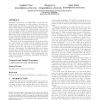Free Online Productivity Tools
i2Speak
i2Symbol
i2OCR
iTex2Img
iWeb2Print
iWeb2Shot
i2Type
iPdf2Split
iPdf2Merge
i2Bopomofo
i2Arabic
i2Style
i2Image
i2PDF
iLatex2Rtf
Sci2ools
128
click to vote
MOBICOM
2003
ACM
2003
ACM
Sound mobility models
Simulation has become an indispensable tool in the construction and evaluation of mobile systems. By using mobility models that describe constituent movement, one can explore large systems, producing repeatable results for comparison between alternatives. Unfortunately, the vast majority of mobility models—including all those in which nodal speed and distance or destination are chosen independently— suffer from decay; average speed decreases until converging to some long-term average. Such decay provides an unsound basis for simulation studies that collect results averaged over time, complicating the experimental process. This paper shows via analysis that such decay is inevitable in a wide variety of mobility models, including the most common in use today. We derive a general framework for describing this decay, and apply it to a number of practical cases. Furthermore, this framework allows us to transform any given mobility model into a stationary one: choose initial speeds fro...
Related Content
| Added | 05 Jul 2010 |
| Updated | 05 Jul 2010 |
| Type | Conference |
| Year | 2003 |
| Where | MOBICOM |
| Authors | Jungkeun Yoon, Mingyan Liu, Brian Noble |
Comments (0)

